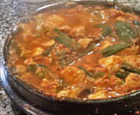|
Caribbean Entree
Curaçao Beef Stew
Stoba di Karni
(Serves 8-10)
Sent in by Cathy Bibbs-Cornell:
___________
A story behind this recipe—we were traveling home from Bonaire and had a layover in Curaçao. To my delight, there was a little snackbar upstairs in the airport with big pans of rice and this tomato-beef mixture. My husband and I love to sample native foods; well, this was one of the most delicious dishes we'd ever eaten!! Tangy, hearty, spicy and very flavorful. That meal, along with a big helping of rice, stayed with us all the way home.
1 1/2 lb beef cut into 1" cubes
Juice of 1 lime
1/2 tsp. garlic powder
Salt and pepper to taste
1/2 tsp. nutmeg
2 T Worcestershire
Dash of hot sauce to taste
1 green pepper (coarsely chopped)
2 stalks celery (coarsely chopped)
1 med onion (coarsely chopped)
1 28 oz. can whole tomatoes (broken up)
4 T butter (I use less)
Toss the meat with the lime juice and season with the next 5 ingredients. Marinate for a few hours.
Sauté the green pepper, celery and onion in the butter. Remove vegetables and brown the meat (with marinade). Add the vegetables and tomatoes and simmer, covered, until meat is tender. (At least an hour.) Add a small amount of water if necessary.
Serve over cooked rice.
_______________
Thanks Cathy! Looks delicious—as well as quick and easy! Thanks, also, for catching the error in the amount of rice in our recipe for Beef & Spinach Stew.
To our readers: Check out Cathy's recipe for Callaloo Soup
| See more Caribbean recipes |
|
|
Tips & Glossary
Caribbean cuisine is an exquisite blend of African, Asian, European, and Carib Indian (the area's original inhabitants) foods. Dishes are highly seasoned, either with a dry rub or marinade —or both. Below are some typical ingredients found in Caribbean food.
Callaloo: young leaves of either the taro root plant or amaranth; used widely in Caribbean cooking. Spinach can be used as a substitute.
Spices: Allspice, bay leaves, black pepper, chives, chili peppers, cilantro, cinnamon, coconut, curry powder, escallion, garlic, ginger, lime, mace, nutmeg, onion, oregano, sugar, thyme, orange, tomato paste, vanilla, cayenne (red) pepper.
Jerk: Jamaican cooking method in which meat is rubbed, prior to grilling, with a blend of seasonings, often firey hot.
Jerk is also the name of the seasoning (from Spanish charqui, or dried meat). You can buy jerk in most grocery stores (even McCormick makes it), or can make and store your own.
• 1 T each—onion powder, garlic powder, dried chives, brown sugar; 2 tsp. each— (ground) allspice, nutmeg, cinnamon; 1 tsp. each—sage. thyme, salt, black pepper, cayenne (or more to taste). Mix thoroughly and store in a tightly covered jar.
There are thousands of versions; figure out what flavors you like most and add or subtract accordingly.
Typical meats: goat, pork, chicken, and some beef (though beef has tended to be expensive).
Fish: varieties that abound in surrounding waters, some familiar to us—grouper, cod, tilapia, blue marlin; others not so—200 species of jack, chip-chips (tiny clams), casadura (primitive armored catfish).
Native plant foods:
• ackee—peach-looking fruit with pulp like scrambled eggs
• annatto (achiote) seed
red coloring or flavoring agent w/ slightly sweet peppery taste.
• cassava root (taro root)
• malanaga root
• scotch bonnet peppers
• breadfruit—fruit used like a potato in salads, stews, even whipped.
• passion fruit
More familiar foods:
bananas and plantains, okra, yams, papaya, mangoes, coconut, yams, sweet potatoes, rice, beans, corn and cornmeal.
|

